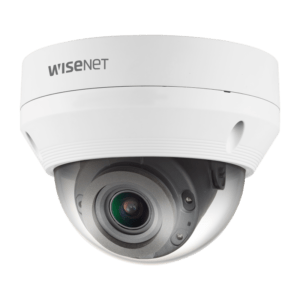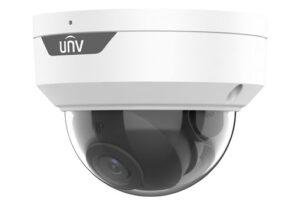The complete guide of CCTV cameras:
Dome CCTV Cameras
overview
Dome CCTV cameras are a type of closed-circuit television (CCTV) camera that are typically used for indoor surveillance purposes. They are named after their dome-shaped housing, which protects the camera lens and makes it difficult for potential intruders to determine the camera’s field of view. Dome cameras are usually mounted on the ceiling and are often used in retail stores, banks, schools, and other public spaces. They come in various sizes, with some being very small and discreet, and others being larger and more noticeable. Dome cameras are often preferred for their attractive design, vandal-resistant housing, and ease of installation. Additionally, they are versatile and can be used in a variety of lighting conditions, as some models come with infrared night vision capabilities.

Dome cameras have several benefits, including:
- Discreet design: Dome cameras have a compact, dome-shaped design that makes them difficult to identify, which can be beneficial for deterring potential intruders.
- Vandal-resistant housing: Dome cameras are often designed with a durable, vandal-resistant housing that protects the camera lens from damage and makes them suitable for use in public spaces.
- Easy installation: Dome cameras are often designed for easy installation, which can reduce the time and cost associated with installing a CCTV system.
- Versatility: Dome cameras can be used in a variety of lighting conditions, and some models come with infrared night vision capabilities, making them suitable for use in low-light environments.
- Wide field of view: Dome cameras often have a wide field of view, which can be beneficial for monitoring large areas or capturing a comprehensive view of a space.
- Affordable: Dome cameras are often more affordable than other types of cameras, making them a cost-effective option for many surveillance systems.
Overall, dome cameras are a versatile and cost-effective option for indoor surveillance, and their discreet design and vandal-resistant housing make them ideal for use in public spaces.
Bullet CCTV Cameras
overview
Bullet CCTV cameras are a type of closed-circuit television (CCTV) camera that get their name from their cylindrical shape, which resembles a bullet. They are often used for outdoor surveillance, as they are designed to withstand harsh weather conditions. Bullet cameras are typically mounted on walls or poles and can be used to monitor a specific area or provide a panoramic view of a space.

Bullet cameras have several benefits, including:
- Durable design: Bullet cameras are designed to withstand harsh weather conditions, making them suitable for use in outdoor environments.
- Long-range viewing: Bullet cameras often have a long-range viewing capability, which can be beneficial for monitoring large areas or capturing a comprehensive view of a space.
- Night vision: Some bullet cameras come with infrared night vision capabilities, which allows them to capture high-quality images in low-light environments.
- Affordable: Bullet cameras are often more affordable than other types of cameras, making them a cost-effective option for many surveillance systems.
- Versatile: Bullet cameras can be used for a variety of purposes, including perimeter security, wildlife observation, and traffic monitoring.
Overall, bullet cameras are a durable and cost-effective option for outdoor surveillance, and their long-range viewing capabilities and night vision capabilities make them ideal for monitoring large areas or capturing high-quality images in low-light environments.
PTZ Pan Tilt & Zoom Cameras
overview
PTZ (pan, tilt, and zoom) cameras are a type of closed-circuit television (CCTV) camera that allow for remote control of the camera’s orientation and zoom. This type of camera is often used in large indoor or outdoor spaces where a comprehensive view of the area is needed. PTZ cameras can be controlled remotely to pan (left and right), tilt (up and down), and zoom in and out, allowing users to easily survey a large area from a single camera.

PTZ cameras have several benefits, including:
- Wide coverage: PTZ cameras provide a comprehensive view of a large area, making them ideal for use in large indoor or outdoor spaces.
- Remote control: PTZ cameras can be controlled remotely, allowing users to easily survey a large area from a single camera.
- Versatile: PTZ cameras can be used for a variety of purposes, including surveillance, traffic monitoring, and wildlife observation.
- Advanced features: Many PTZ cameras come with advanced features, such as auto-tracking, motion detection, and night vision, which can enhance their surveillance capabilities.
- Cost-effective: PTZ cameras can be more cost-effective than installing multiple fixed cameras, as they provide the same level of coverage with a single camera.
Overall, PTZ cameras are a versatile and cost-effective option for large indoor or outdoor spaces where a comprehensive view of the area is needed. Their remote control capabilities and advanced features make them ideal for use in a variety of surveillance and monitoring applications.
Day/Night CCTV Cameras
overview
Day/Night CCTV cameras are a type of closed-circuit television (CCTV) camera designed to provide clear video footage both during the day and at night. These cameras use infrared (IR) technology to capture images in low-light conditions and switch automatically to day mode when sufficient light is available.

Day/night cameras have several benefits, including:
- Versatility: Day/Night CCTV cameras are designed to work in a variety of lighting conditions, making them ideal for use in areas where lighting may vary.
- Enhanced surveillance: With the ability to capture clear footage in low-light conditions, Day/Night CCTV cameras can provide enhanced surveillance in areas with limited lighting.
- Night vision: Day/Night CCTV cameras come with night vision capabilities, allowing them to capture clear footage in total darkness.
- Cost-effective: Installing a single Day/Night CCTV camera can be more cost-effective than installing separate day and night cameras.
- Ease of installation: Day/Night CCTV cameras can be installed and configured just like any other CCTV camera.
Overall, Day/Night CCTV cameras are a versatile and cost-effective option for areas where lighting conditions may vary. Their ability to capture clear footage in both daylight and low-light conditions makes them ideal for use in a variety of surveillance and monitoring applications.
Infrared/Night Vision CCTV cameras
overview
Infrared/Night Vision CCTV cameras are a type of closed-circuit television (CCTV) camera that uses infrared (IR) technology to capture images in low-light or total darkness. These cameras are equipped with IR illuminators that emit invisible light in the IR spectrum, allowing them to capture clear images even in complete darkness.

Infrared/Night Vision cameras have several benefits, including:
- Versatility: Day/Night CCTV cameras are designed to work in a variety of lighting conditions, making them ideal for use in areas where lighting may vary.
- Enhanced surveillance: With the ability to capture clear footage in low-light conditions, Day/Night CCTV cameras can provide enhanced surveillance in areas with limited lighting.
- Night vision: Day/Night CCTV cameras come with night vision capabilities, allowing them to capture clear footage in total darkness.
- Cost-effective: Installing a single Day/Night CCTV camera can be more cost-effective than installing separate day and night cameras.
- Ease of installation: Day/Night CCTV cameras can be installed and configured just like any other CCTV camera.
Overall, Infrared/Night Vision CCTV cameras are an effective solution for areas where lighting is limited or non-existent. Their ability to capture clear images in low-light and complete darkness makes them ideal for use in a variety of surveillance and monitoring applications.
Network/IP CCTV cameras
overview
Network/IP CCTV cameras are digital cameras that use the Internet Protocol (IP) to transmit video and audio over a network. Unlike traditional analog CCTV cameras, IP cameras use digital compression to transmit video over a network, allowing for higher-quality images and more flexible and scalable surveillance systems.

Network/IP CCTV cameras have several benefits, including:
- High-quality images: Network/IP CCTV cameras offer higher image resolution and better image quality compared to analog cameras.
- Remote access: Network/IP CCTV cameras can be accessed from any location with an internet connection, allowing for remote monitoring and management.
- Scalability: Network/IP CCTV cameras can be easily added to or expanded within a networked surveillance system, providing scalable and flexible surveillance solutions.
- Integration with other systems: Network/IP CCTV cameras can be integrated with other networked systems, such as access control systems and burglar alarms, to provide a comprehensive security solution.
- Cost-effectiveness: Network/IP CCTV cameras can often be less expensive in the long run compared to traditional analog CCTV cameras, due to the ability to remotely manage and upgrade the system.
Overall, Network/IP CCTV cameras offer a flexible and scalable solution for digital surveillance, with high-quality images and the ability to remotely access and manage the system. They are ideal for use in a variety of residential, commercial, and industrial settings.
Wireless CCTV cameras
overview
Wireless CCTV cameras are security cameras that transmit video and audio signals wirelessly, eliminating the need for physical cabling. They are designed to be easy to install and can be placed in a variety of locations without being restricted by the need for a power source or network cable.

Wireless CCTV cameras have several benefits, including:
- Easy installation: Wireless CCTV cameras do not require physical cabling, making them easy to install and relocate.
- Flexibility: Wireless CCTV cameras can be placed in a variety of locations, including remote or hard-to-reach areas, without being restricted by the need for a power source or network cable.
- Cost-effectiveness: Wireless CCTV cameras can be more cost-effective compared to wired cameras, as they eliminate the need for physical cabling and installation costs.
- Improved coverage: Wireless CCTV cameras can be placed in multiple locations to provide complete coverage, and they can also be linked with other wireless cameras to provide a comprehensive surveillance solution.
- Portability: Wireless CCTV cameras are portable and can be easily moved between locations, making them ideal for temporary surveillance solutions, such as construction sites or special events.
Overall, wireless CCTV cameras offer a flexible and cost-effective solution for digital surveillance, with the ability to be placed in a variety of locations without being restricted by physical cabling. They are ideal for residential, commercial, and industrial applications where ease of installation and flexibility are important considerations.
High Definition (HD) CCTV cameras
overview
High Definition (HD) CCTV cameras are security cameras that capture and transmit video in high definition resolution, typically 720p or 1080p. They provide clearer, more detailed images compared to standard definition (SD) cameras, which have a lower resolution.

High Definition (HD) CCTV cameras have several benefits, including:
- Improved image quality: HD CCTV cameras provide sharper, more detailed images than SD cameras, making it easier to identify people, objects, and other details.
- Better evidence: HD CCTV cameras can provide higher quality footage that can be used as evidence in legal or insurance cases.
- Increased situational awareness: With the ability to capture clear, high-definition images, HD CCTV cameras provide improved situational awareness, enabling operators to make more informed decisions.
- Wide compatibility: Most modern security systems are designed to be compatible with HD CCTV cameras, allowing users to easily upgrade their existing systems to take advantage of the improved image quality.
- Increased storage capacity: HD CCTV cameras require more storage capacity compared to SD cameras due to the higher quality video footage they capture. However, advances in storage technology have made it more affordable to store HD footage.
Overall, HD CCTV cameras provide improved image quality and increased situational awareness, making them ideal for applications where detail is important, such as in retail environments, schools, and government buildings. They are also ideal for use in residential and commercial environments, where the improved image quality can provide greater peace of mind and protection.






